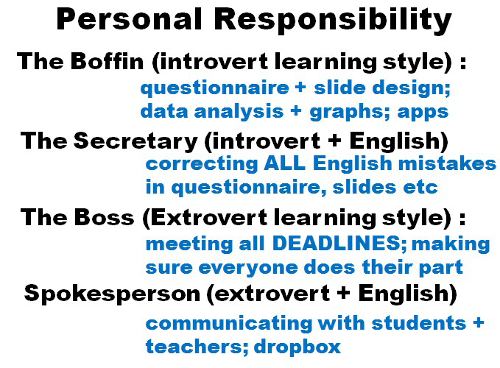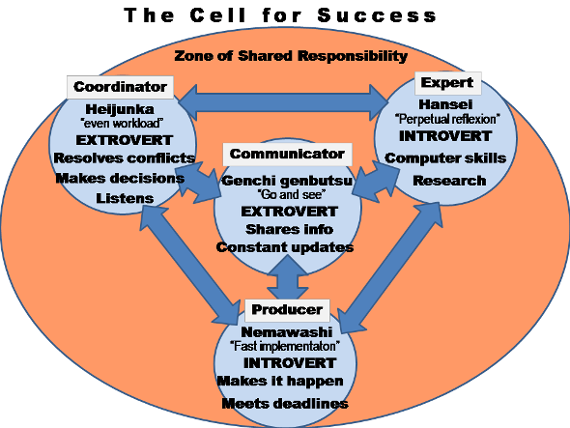|
INTRODUCTION TO PBL & COOPERATIVE
LEARNING |
|
Projects for class are back! The
latest research in education now
clearly indicates that learning in
groups can get
excellent results. Amazing people
backing this trend include Sir
Ken Robinson, truly a knight in
shining armour and Elon Musk,
current world genius No.1. |
|
What is wrong with the traditional
classroom? |
|
-The
traditional classroom principally
teaches people how to sit still in
silence for 6 hours a day. |
|
What
jobs and professions demand that
skill? Not many. |
|
-Within
7 days of taking an exam we have
forgotten 80% of what we have
studied. |
|
Want
proof? See
Hermann Ebbinghaus's Curve of
Forgetting. |
|
What's so good about project-based
learning? |
|
-Students learn skills companies
really need: |
|
How to
work in a team. |
|
Leadership skills |
|
They
develop their creativity and learn
to think outside the box. |
|
They see that new knowledge means
new possibilities. |
|
They
learn
by discovery and sharing and so
become both independent learners and
team players at the same time. |
|
They
quickly develop IT skills such as
search engine skills and presentation
and video-making techniques. |
|
-Because working in groups is fun, learning becomes an emotional
experience and so new knowledge is
retained. This is what the research
says: |
|
Emotionally charged classes are
remembered better. |
|
Pleasant emotions are generally
remembered better than unpleasant
ones. |
|
Positive memories contain more
contextual details which helps the
memory. |
|
It's the emotions, not the
information, that helps us remember. |
|
We pay
attention better in a class which is
also an emotional experience. |
|
Indeed,
our attention is activated by
various kinds of emotional arousal. |
|
Emotion helps the memory at
encoding, consolidation, and
retrieval. |
|
(For more info visit Dr Mc Pherson's
website
here.) |
|
-Meaningful learning takes place. |
|
This means that what they are
learning is connected to what they
already know. This is in stark
contrast to our typical textbooks
which divide knowledge into discrete
units which have nothing or very
little to do with one another. |
|
How
to form successful groups. (Cooperative
learning) |
|
What tends to go wrong. |
|
-In groups
made up of friends, students have a great time
but underperform. |
|
-Groups
contain freeloaders who contribute
very little but reap the rewards of
others. |
|
Optimum group composition. |
|
-Most
sources claim that groups of four
generally work best. If groups are
bigger, freeloaders may go
undetected and get the free ride
they were looking for. A freeloader
is a student who is simply
unmotivated. We need to find ways to
motivate them! |
|
-Mixed
sex groups generally outperform
single sex groups. So for a group of
four, we are looking at two
females and two males for
optimum performance. Check it out in
the field. |
|
-Groups
of mixed ability generally
function at optimum levels. |
|
Different people have different
strengths - this is shown by what we
now know about
multiple-intelligences. |
|
I
once worked with a group of four
students with very high logic or
mathematical intelligence. They were
delighted to be together but when it
came to using their imaginations for
putting together a project they had
tremendous diffiulties. |
|
Many
methodologies recommend that each
group contains: one person who
achieves high grades in English, one
student who has difficulties with
the subject and two average
performance students. |
|
one
student who achieves high grades
in English |
|
one
student who has difficulties
with the subject |
|
two
students with average grades
in English |
|
|
This is
a magic formula no less and provides
the best environment for peer
learning and teaching to occur. It
is in fact party time for our
students' metacognitive skills.
They will learn how to exteriorize
their ideas and difficulties and
discuss and set goals and outcomes
both for themselves and their group. |
|
-Mixed
cognitive learning styles |
|
In
learning theory there is a continuum
called extrovert introvert learning
styles. Extrovert style learners are
described as "learning best by
talking and interacting with
others". Introverted types prefer
quiet reflection and privacy and
process information by exploring
ideas and concepts internally. (Read
more
here.) |
|
I have
found it very useful to find out
where students lie on this continuum
and then make sure each group
contains two extrovert style
learners and two introvert style
learners. |
|
To find
out, students answer the following
questionnaire: |
|
learning styles questionnaire |
|
This is
a word document you may alter and
share at your will. I have squeezed
three questionnaires onto one page
in order to save photocopies. |
|
Make
sure students know that the results
are just an indication which
students may perfectly refute and
reject. |
|
So, each
group or team should contain: |
|
one
female
student with an
extrovert learning style |
|
one
female student with an
introvert learning style |
|
one
male student with an
extrovert learning style |
|
one
male student with an
introvert learning style |
|
|
-Assigning Roles |
|
One way
to help motivate students in a group
and to allow them to develop
themselves as autonomous learners is
to assign a role to each student.
This measure also encourages
freeloaders to take part as they
have nowhere to hide. Everybody
has clearly defined roles. In my
classes I have tried to relate
assigned roles to every student's
particular strength and cognitive
learning style. |
|
Bob Wilson's Group Roles |
Julián Sanz Mamolar's
Roles |
Juan Carlos Palomino's
Roles |
|
Boss |
Leader |
Coordinator |
|
Secretary |
Timekeeper |
Supervisor |
|
Boffin |
Recorder |
Observer |
|
Spokesperson |
Scribe |
Spokesperson |
|
|
By
comparing all the marks my classes
obtained over a term, I found that
the best performing groups had the
following composition: |
|
Boss
= Female with an extrovert learning
style |
|
Secretary = Female with an introvert
learning style and strong English
skills |
|
Boffin = Male with an introvert
learning style |
|
Spokesperson = Male with an
extrovert learning style and strong
English skills |
|
|
These
are the tasks I gave to each role
for a project which involved making
a presentation. |
|
 |
|
Below is
my latest idea for assigning roles
in groups of four. I have drawn from
personality and learning style
frameworks, lean management and
first principles thinking. Lean
management defines processes which
should occur in companies in order
to achieve successful outcomes. I
have included the Japanese terms and
their approximate translation. I
have used first principles thinking
as advocated by Elon Musk in order
to try to work out what are the four
essential roles for a successful
group of four people and I have
added their functions. I have used a
cell structure in order to show that
all players are bound by a shared
responsibility for the success of
the team. |
|
 |
|
Notice
that I have dispensed the terms
'boss' and 'boffin'. 'Boss' is a
rank and I want all members to feel
that they have equal status.
'Boffin' is not an insult but it
means something like 'nerd'.
'Expert' is a positive word.
'Communicator' is more both for
internal and external communication
and therefore more complete than
'spokesperson'. Again, 'producer' is
a more powerful role than
'secretary', 'supervisor' or
'timekeeper'. It has strong
connotations to do with the movie
business and companies. |
|
Evaluation |
|
A contract |
|
-Students
need to be aware that in order for
group work to be worth it, they have
to respect the rules and take it
seriously. |
|
Students
also need to see you walking around
with a clipboard in your hand. Does
wonders. Here is an editable work
doc you may download for the
purpose: |
|
Project Observation Sheet |
|
Rubrics |
|
-Rubrics
are a great way to evaluate students
because you get a description of
their progress as well as a mark.
Download the following rubric and
adjust it to your needs: |
|
Rubric for Project-Based Learning |
|
I used
this rubric for a documentary-making
project so you will need to change
the criteria being evaluated and the
descriptors. I have squeezed three
rubrics per page to cut down on
photocopying expenses and
environmental impact. |
|
I now
use Google sheets to evaluate my
students' project work. It means I
don't have to use paper anymore. You
can access a template here: |
|
Rubric on a Google Drive Spreadsheet
for Project-Based Learning |
|
What should we be evaluating? |
|
As with
everything, I am continuously
considering this and I have a strong
hunch that we are doing it all
wrong. First principles thinking
says we should be evaluating skills
that our students are going to need
when they go out into the world and
hopefully find fulfilling and
prosperous functions in the
societies of their times. I stumbled
across this list of skills |
|
According to the World Economic
Forum, the skills required of our
young people for the year 2020 in
the labour market are the following: |
|
1. |
Complex
problem solving |
|
2. |
Critical
thinking |
|
3. |
Creativity |
|
4. |
People
management |
|
5. |
Coordinating with others |
|
6. |
Emotional intelligence |
|
7. |
Judgment
and Decision making |
|
8. |
Service
Orientation |
|
9. |
Negotiation |
|
10. |
Cognitive Flexibility |
|
|
Link to
World Economic Forum
here. |
|
My
feeling is that we should be moving
towards helping our students require
the above listed skills. |
|
I will
finish now with a quote from a
marvellous expert in education
called Jerome Bruner who recently
passed away at the age of 100! |
|
“I’m
becoming increasingly convinced that
the powers of mind reach their
fullness not simply in accumulation
– in what we come to know – but
rather in what we can do with what
we know, how we are enabled to frame
possibilities beyond the conventions
of the present, to forge possible
worlds.” Jerome Bruner. |



